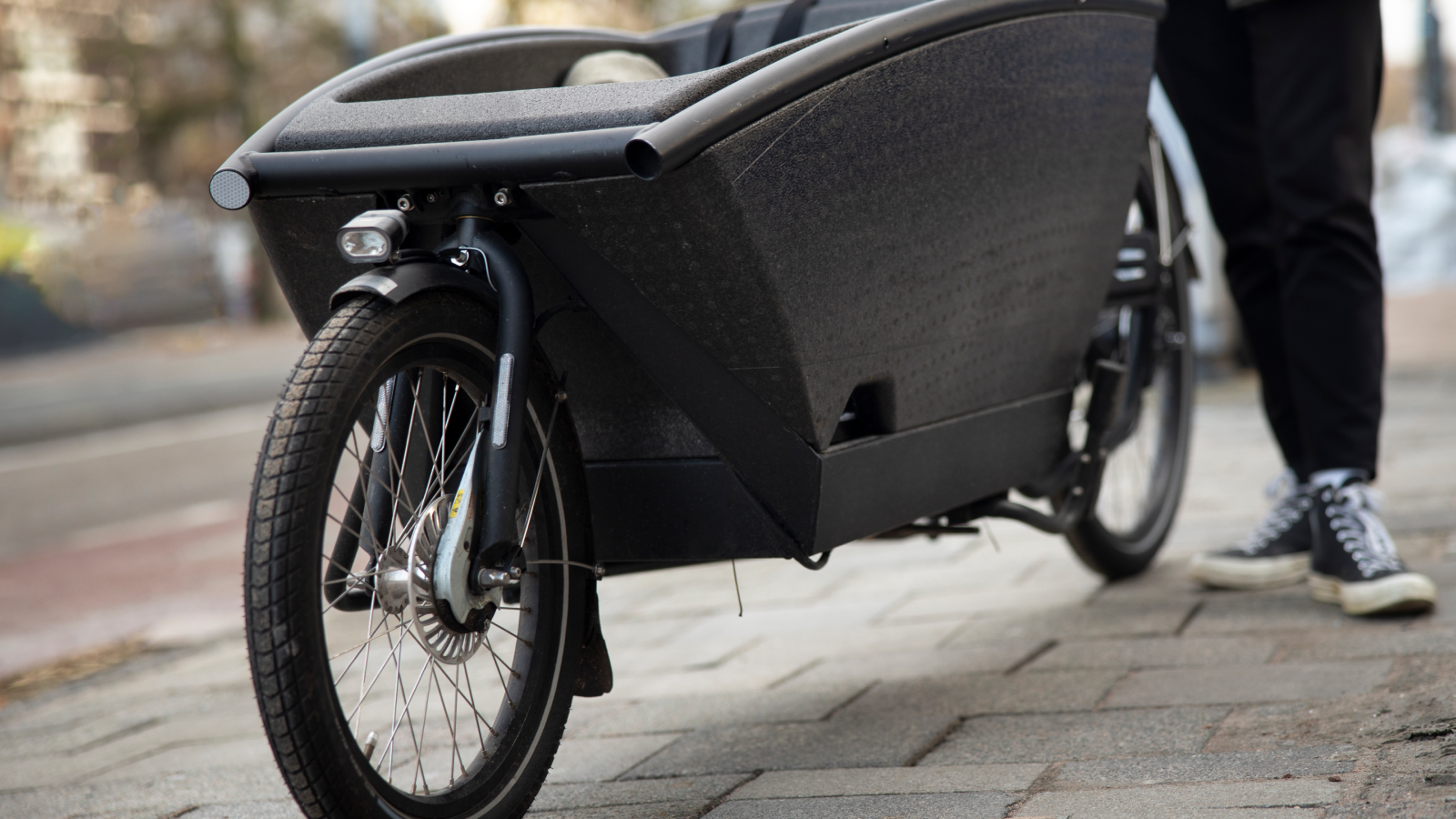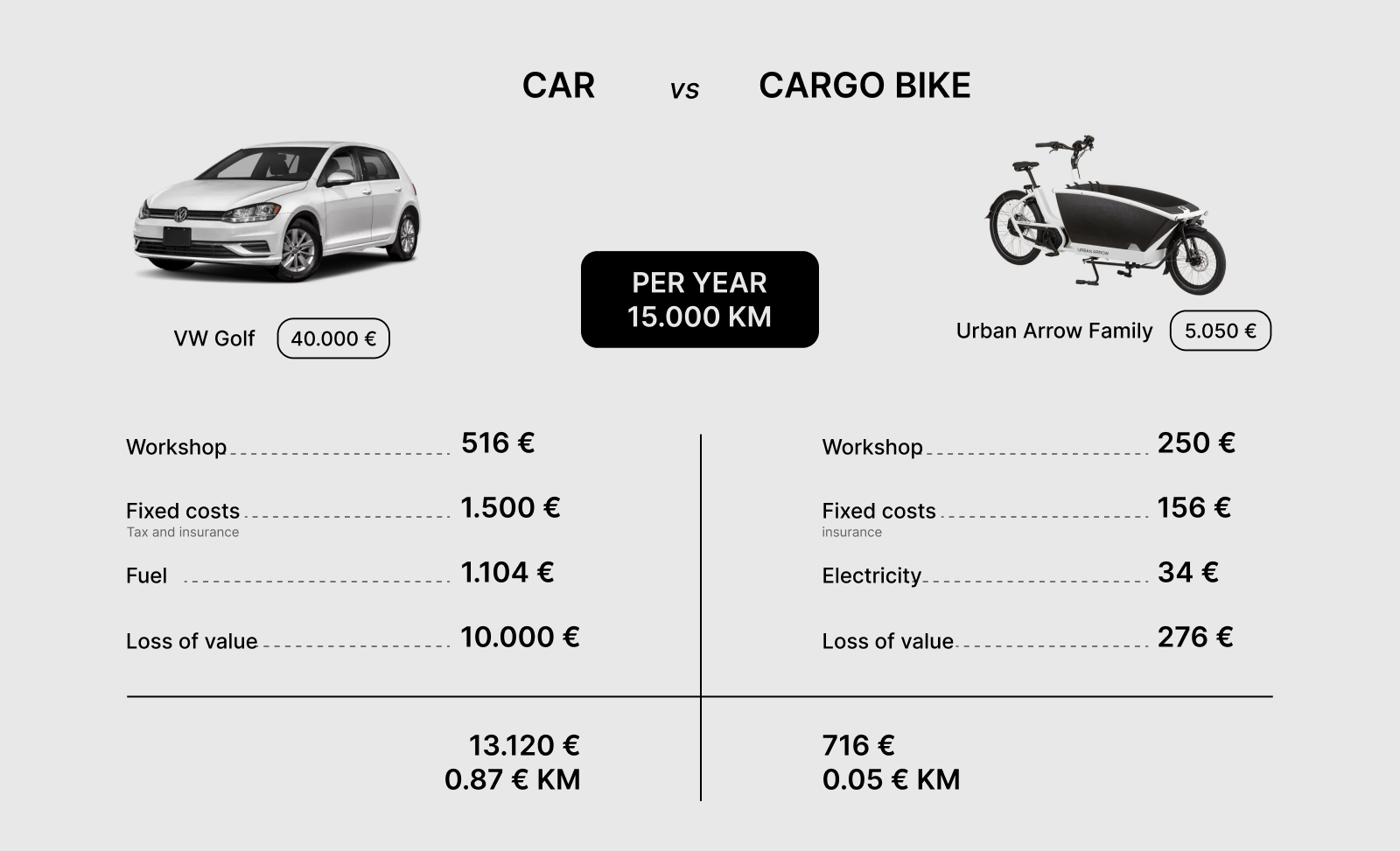Buying an electric cargo bike: What should you look out for?

22 Jun
·
Knowledge

Cargo bikes are bicycles specially designed for transporting objects or people. Unlike conventional bicycles, they have a reinforced frame construction and a special loading area or transport box. These allow riders to transport loads of all kinds safely and efficiently. In recent years, interest in cargo bikes, and especially e-load bikes, has increased rapidly.
`
This trend can be attributed to several factors. First, cargo bikes are environmentally friendly and sustainable, as they do not produce harmful emissions and help reduce traffic and parking problems in urban areas. Second, e-load bikes offer additional power with their electric assistance, which makes it easier to transport heavy loads or negotiate inclines. This makes them an attractive alternative to conventional vehicles such as cars or vans.
`
In the following article, we will take an in-depth look at cargo bikes and e-bikes, examine how they work, their advantages and areas of application, and help you make the right choice.

The origin of cargo bikes
The history of cargo bikes goes back a long way and has its origins in the early days of the bicycle itself. As early as the 19th century, cargo bikes were used as practical means of transportation. Initially, these were simple bicycles with larger racks or trailers that allowed people to transport goods and merchandise. Over time, these bicycles were further developed and optimized specifically for transporting heavy loads. They were particularly popular in cities, as they offered an efficient and cost-effective solution for transporting goods within the city.
`
From bakers and butchers to delivery services and craftsmen, cargo bikes were used in various trades. With the introduction of electric cargo bikes, the range of uses has expanded, and more and more people are recognizing the versatility of these practical means of transportation.
What are the advantages?
Cargo bikes offer a variety of advantages that make them an attractive alternative to conventional vehicles. One of the most significant advantages is their environmental friendliness and sustainability. Because cargo bikes rely purely on human muscle power or the assistance of an electric motor, they do not produce harmful emissions and thus help reduce air pollution and carbon dioxide emissions. This is particularly important given growing concerns about climate change and the need to promote sustainable mobility solutions.
`
Another benefit of cargo bikes is their ability to address traffic and parking issues in urban areas. In busy cities where congestion and limited parking are commonplace, cargo bikes offer an efficient alternative. They can ride comfortably on bike paths and usually have no difficulty finding a suitable parking space. This saves time and nerves and helps relieve traffic congestion.
In addition to the ecological benefits, cargo bikes also offer considerable cost savings compared to cars. The purchase cost of a cargo bike is usually much lower than that of a car, and the running costs are also significantly lower. There are no high gasoline or maintenance costs, and insurance costs are often lower or eliminated as well. Cargo bikes are a cost-effective alternative for everyday transportation needs, whether for shopping, transporting children, or getting to work.
Two- or three-wheeled? What is the best fit for you?
Cargo bikes come in a variety of designs tailored to individual needs and transport requirements. A basic distinction is between two- and three-wheeled models. Two-wheeled cargo bikes are similar in design to conventional bicycles, but have an extended or reinforced rear axle to create space for the cargo area. They are maneuverable and offer high maneuverability. Three-wheeled cargo bikes, on the other hand, have two wheels on the front axle, which gives them added stability and carrying capacity. They are particularly suitable for transporting heavier loads or for use on uneven terrain.
The designs and construction methods of cargo bikes vary depending on the manufacturer and the intended use. There are models with an open transport box that can carry larger items or several children. Other cargo bikes have a closed transport box that protects the contents from the elements. There are also models with special devices for attaching child seats, shopping baskets or tools to meet the needs of different users.
In addition, there are specialized cargo bikes for different types of cargo transportation. For example, there are cargo bikes designed specifically for transporting children, with appropriate seat belts and seats. Other models are designed to transport large and heavy goods, such as furniture or building materials, and have a high load capacity.
Or maybe electric?
Cargo bikes with electric assistance, also known as cargo e-bikes, have gained popularity in recent years. They function similarly to e-bikes and use an electric motor to provide additional pedaling assistance. The electric assistance can make riding with heavy loads or negotiating inclines easier, allowing for a more enjoyable and stress-free ride. E-load bikes offer the advantage of a longer range and can travel longer distances. Battery technology has improved, and many models offer sufficient battery life for daily use. Charging times vary by model and battery capacity, but are usually relatively short.
Possible applications of cargo bikes
E-load bikes have a wide range of uses and open up completely new perspectives for families and households as well as for businesses. For families and households, e-load bikes are extremely practical and versatile, like the Muli cycles load bikes. They are great for shopping and allow transporting bulky items or a large amount of groceries. Thanks to the electric assistance, the heaviest things become easy and transporting heavy loads becomes a breeze. E-load bikes are also an ideal solution for transporting children. Equipped with special seats or transport boxes, they offer a safe and environmentally friendly alternative to the car for the way to school or trips around town. Even pets can ride comfortably in an e-bike and enjoy the fresh air.
But e-load bikes are not only beneficial for families. Commercial operators have recognized the advantages of these innovative means of transportation. Delivery services, such as those provided by Rewe, among others, can increase their efficiency while reducing their environmental impact by relying on e-load bikes. They enable fast and flexible deliveries, especially in busy city centers, and offer sufficient storage space for parcels or groceries. Craftsmen also benefit from the advantages of e-load bikes. With special bodies and tool attachments, they can transport their equipment comfortably and reach construction sites quickly without having to search for parking spaces.
Logistics with cargo bikes
Furthermore, e-load bikes are playing an increasingly important role in the field of logistics and inner-city goods transport. They offer a sustainable alternative to delivery trucks and reduce traffic and emissions in densely populated areas. E-bikes are increasingly being used by businesses to transport goods over short distances, whether for retail, catering or parcel delivery. They are maneuverable, easy to maneuver and can avoid traffic jams, resulting in an efficient and time-saving solution. For example, from summer 2018 to summer 2019, 11 e-load bikes were able to deliver 126,000 parcels in Berlin, saving 28,000 van kilometers or around 4,140 liters of diesel fuel.
How do I decide to buy?
When selecting an e-bike, load capacity, range and equipment are important selection criteria. It is advisable to analyze the cost and economy and consider long-term savings compared to motorized vehicles. A test ride and advice will help with the decision. Field reports from users and practical examples offer additional insight into the practical use of e-load bikes and can help with the purchase decision. An informed decision enables the optimal use and advantages of an e-load bike.

`
Federal funding for cargo bicycles
Various players are eligible to apply for funding. These include private companies regardless of their legal form, companies with municipal participation, municipalities, public corporations, and associations with legal capacity. For municipal enterprises without legal personality, the respective municipality is eligible to apply. Private individuals, on the other hand, are not eligible to apply.
The funding covers the purchase of cargo bicycles (cargo pedelecs) and cargo trailers with electric drive support. An eligible e-load bicycle must be propelled by muscle power, have at least two wheels and have a permanently installed device for transporting loads. The pedal assistance must not exceed 25 km/h.
The subsidized e-load bicycles and e-load trailers must be standard and brand-new, have a payload of at least 120 kg, and offer greater transport capabilities than a conventional bicycle. Not eligible are cargo pedelecs and e-load trailers designed for passenger transport or to be used for private purposes such as shopping or commuting to work.
How much is subsidized?
The amount of funding is based on the eligible project-related expenses. 25 percent of the acquisition costs are reimbursed, up to a maximum of 2,500 euros per e-load bicycle or e-load trailer. For a better illustration, here is an example: If an e-load bicycle is purchased for 3,646 euros (net), the subsidy is 25 percent of that, or 911.50 euros.
Various options are available for financing the purchase. Installment purchase is permitted as long as the financing contract clearly refers to the subsidized unit. In the case of lease-purchase, the transfer of ownership must be recorded in the lease-purchase contract within three years of the completion of the measure and, again, the contract must clearly refer to the subsidized unit. Financing via leasing, on the other hand, is not permitted.
Applications for funding can be submitted until February 29, 2024.
Conclusion
The future for e-load bikes and e-bikes looks promising, whether from Muli cycles, Babboe or other manufacturers. Their advantages in terms of sustainability, traffic reduction and cost savings make them an attractive alternative for the mobility of the future. Cargo bikes offer versatile options for transporting loads and people. E-load bikes will play a significant role as they help reduce traffic congestion and provide a sustainable alternative to cars.
`
As technology develops and adoption increases, e-load bikes will become a fixture in urban areas. Promoting the use of e-load bikes is an important step towards sustainable and efficient mobility in our cities. Cargo bikes and especially e-load bikes are a worthwhile investment in sustainable mobility and contribute to the sustainable development of our cities.
And if you are interested in a reconditioned bike/e-bike with quality, simply use our Bike Finder.
More useful tips and information can be found in our blog.
Kind regards Your Velio Team










